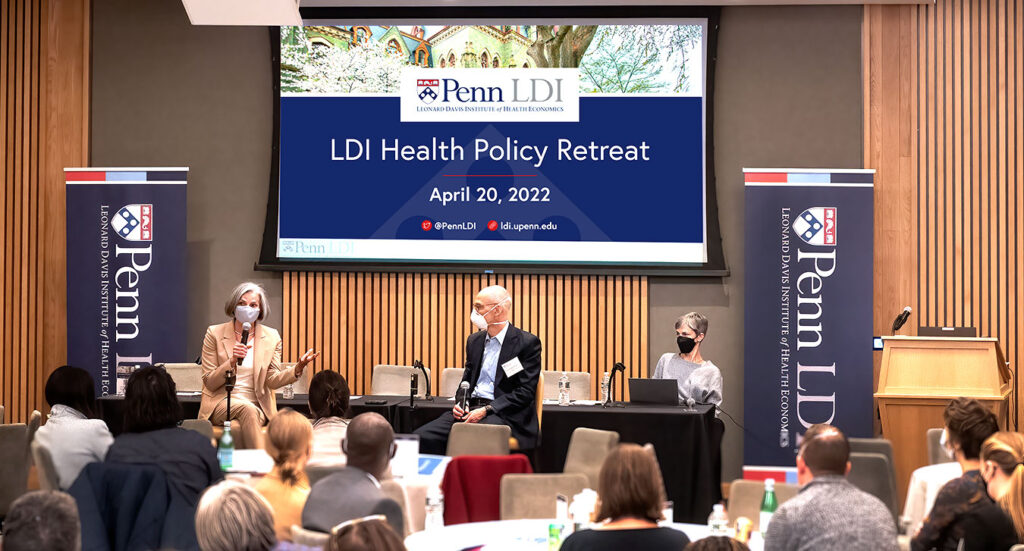
One Agency’s Maps Are Known For Documenting Redlining
But Many Other Factors Played a Role in Denying Loans, LDI Fellow Says
Population Health
News

Despite how the COVID-19 pandemic has underscored its importance, the U.S. emergency preparedness system remains ineffectively organized or funded and will likely continue that way after the pandemic is over, former CDC Director Julie Gerberding, MD, MPH, told an April 20 health policy retreat at the University of Pennsylvania.
Gerberding was a keynote speaker along with LDI Fellow Ezekiel Emanuel, MD, PhD, at the annual health policy retreat of Penn’s Leonard Davis Institute of Health Economics (LDI). As CDC chief from 2002 to 2009, Gerberding led the CDC through more than 40 emergency health responses including anthrax attacks, SARS, Hurricane Katrina, H5N1, and H1N1. She is currently CEO of the Foundation for the National Institutes of Health (FNIH).
Now University of Pennsylvania Vice Provost for Global Initiatives, Emanuel was a former special advisor to the White House on health care issues during the creation of the Affordable Care Act.
In their session at LDI’s first in-person health policy retreat in more than two years, the two experts discussed how the CDC’s reputation and credibility have been severely impacted by internal missteps and the intense politicization of the scientific institution’s COVID-19 response.
The situation was previously summed up in The New York Times reporting that asked “What Went Wrong” at the CDC during the pandemic: “The technology was old, the data poor, the bureaucracy slow, the guidance confusing, the administration not in agreement. The coronavirus shook the world’s premier health agency, creating a loss of confidence and hampering the U.S. response to the crisis.”
While Gerberding and Emanual both lauded current CDC Director Rochelle Walensky, MD, MPH, for her efforts since she took over 16 months ago, their comments painted a bleak picture of an agency and its interconnected national emergency response system that face daunting challenges as they move forward toward the next national health emergency.
“If you step back and look at what would be expected and what actually happened, the gaps are obvious,” said Gerberding. “It is reasonable to expect that in the context of a public health emergency, our public health system would be able to detect and monitor the spread of an infectious disease of global concern; that it would be able to facilitate and expedite the development of tests to diagnose those conditions early enough so that we would have a pretty good understanding of what was going on; that we would have had rapid access to information about modes of spread, populations affected, basically the epidemiology of what was going on. Beyond that, on an ongoing basis, the process of translating evolving science into sensible, practical, implementable guidance with credibility and good communication was a major gap. Then, the biggest and most tragic gap was the lack of hospital preparedness to really deal with the pandemic, the strategic national stockpile, and the failure to resupply things fundamental like masks that were used up during the last outbreak.”
Referring to the economics of those failures, Emanuel noted that “years of starvation” of the CDC and preparedness program funding played a major role in setting up the situation that the agency found itself in during the pandemic.
Gerberding agreed. “The biggest structural problem is budget,” she said. “The CDC is funded on an annual budget plus emergency supplemental money once a crisis has emerged. As soon as the crisis is over, the money goes away and preparedness is usually the first to suffer — because you can’t hire people on one-time money. So, our public health system has not been a sustained investment for workforce development and health issues.”
“From an economic perspective,” Gerberding continued, “the other aspect of the structural budget is that if you invest in preparedness, how do you score that in the context of a balanced budget? So we need a different mechanism for funding preparedness, something that looks more like the Department of Defense. You don’t say to the Army, ‘Oh, you had those tanks, but you didn’t really use them this year. So, therefore, we’re not going to fund those tanks anymore.’ We know we can’t continue the current approach to funding something as vital to our national security and our international security as emergency preparedness.”
One of the government’s most perceived critical shortcomings since the beginning of the pandemic has been the lack of a timely, accurate, and dependable centralized source of national epidemiological data of coronavirus’ spread. Many people assume such data gathering is an official role of the CDC, but it isn’t. The U.S. Constitution gives the federal government certain powers and reserves other powers for the states, and data collection authority is tangled in this.
“In a public health emergency,” Gerberding explained, “there is some help to do certain things in a declared emergency setting; but foundationally, the CDC has no real leverage to require data reporting. We can’t make the states report data to the CDC.”
“In a post-pandemic review, I hope we go back and understand the biggest lever and the constitutionally legal lever for data collection is money,” Gerberding said. “If we’re sending money to the states to do X, Y or Z, there is a perfectly legitimate framework for saying you must provide data or you must do things a certain way or up to a certain level of standards. But the problem is that’s unpopular. And it very quickly gets political because as soon as you start pulling those levers, somebody from some state or from a different political party will complain to Congress. And then you’re in the hearing room and the machinery goes into play.”
“So I know firsthand it’s very, very difficult to use those levers if you don’t have advocacy” Gerberding said. “The choir knows what the problems are and what needs to be done. But the advocacy is weak, and I don’t like PACs and super PACs, but Washington works that way. And until we get people demanding that we actually properly invest in preparedness, it won’t happen.”
“We’re already seeing that the pandemic is moving into the rearview mirror, and we will not end up net net in a better position than we were before we started,” the former CDC Director concluded. “We’re going to have to build strong advocates. And I think the business community could be part of that advocacy because they were hurt hard by this pandemic and preparedness is insurance to them. If we had better preparedness and better response capability, businesses would not have paid the humanitarian price their workers experienced, as well as the incredible economic and financial hits many businesses have yet to recover from.”


But Many Other Factors Played a Role in Denying Loans, LDI Fellow Says

Offit and Buttenheim Criticize HHS Placebo Trial Mandate as Unethical, Misleading, and a Threat to Vaccine Confidence

A Penn LDI Virtual Seminar Explores the Latest Trends in Anchor Institution Operations

Neighborhood Perceptions May Also Affect PTSD and Depression Recovery After Serious Injury

A Penn LDI and Opportunity for Health Lab Virtual Seminar Explores Economic Assistance Programs

Testimony: Delivered to Philadelphia City Council